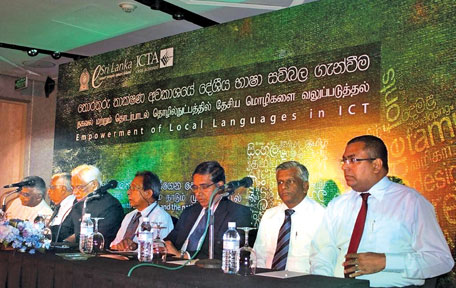'ICT dividends must be taken to the village in Sinhala and Tamil'
“If the dividends of ICT are to be taken to every village, every
citizen…’ it had to be done in Sinhala and Tamil”. said ICT Agency of
Sri Lanka (ICTA) Board Member and Local Language Initiative (LLI)
Chairman Dr. R. B. Ekanayake. He was participating in a multi-pronged
launch that at Jaic Hilton, Colombo recently
Dr. Ekanayake pointed out an important imperative for the filfilment
of a goal in the ‘Mahinda Chintana Vision for the future’ ‘If the
dividends of ICT are to be taken to every village, every citizen…’ it
had to be done in Sinhala and Tamil, Dr. Ekanayake said. Explaining the
rationale for the LLI Dr. Ekanayake said: “Most people in Sri Lanka use
Sinhala and Tamil. Most are not conversant in English.
English is necessary but learning a foreign language takes time. The
ICTA Local Language Initiative (LLI) therefore had to be implemented
immediately after ICTA’s commencement”.
 |
|
The ICTA Board and LLI member Prof.
Vijaya Kumar, ICTA Board member and LLI Chairman Dr. R. B.
Ekanayake, Professor J. B. Disanayaka, Telecommunication and
Information Technology Ministry Secretary Nimal A.
Athukorala, ICTA Chairman Prof. P. W. Epasinghe, Sri Lanka
Standard Institution Director General Dr. L.N.Senaweera and
ICTA CEO Reshan Dewapura |
In the recent past several projects have been completed under ICTA’s
“Local Language Initiative” and the Wednesday event was held to launch
the following:-
a. The third revision of the Sri Lanka Sinhala Character Code for
Information Interchange which has been approved by SLSI as a Sri Lanka
Standard, SLS 1134 : 2011. This version includes encoding for Sinhala
numerals. This is to be launched in partnership with the Sri Lanka
Standards Institution (SLSI).
b. Six new stylised Sinhala fonts have been designed by the trainees
who underwent ICTA’s font development training. – there has been
resistance from various sectors towards using Unicode fonts citing the
fact that only “serious” Unicode fonts were available. Now several
Unicode Sinhala fonts of different styles have been developed.
c. A new Unicode Tamil font ‘Sri Tamil’ .
d. Six new stylized Tamil fonts - “Chemmoli” series.
e. A book on how to develop Sinhala and Tamil fonts.
f. A keyboard driver for using Apple Mac with a Unicode Sinhala font -
Mac Bhashitha.
At present using Unicode Sinhala and Tamil is the norm. Local
language content is being created. Nearly 300 Unicode compliant
trilingual government websites are now available. There are other
numerous sites providing assistance and information in Sinhala and
Tamil, such as, www.subasa.lk People are now registering domain names in
Sinhala and Tamil under the top level domains.
Certificates to font developers and tokens of appreciation to Local
Language Working Group (LLWG) were presented.
The present LLWG members Dr. R. B. Ekanayake (Chairman), Prof. V.
Kumar, Dr. Ruvan Weerasinghe, Channa de Silva, Prof. Gihan Dias, Ms.
Dineesha Ediriweera, Mr. G. Balachandran, Dr. Sandagomi Coperahewa,
Chamara Dissanayake, Venerable Bhikkhu Mettavihari, Mr. Harsha
Wijaywardhana, Mr. J. Yogaraj, Susil Maduwage and N. Sivakumaran.
Former LLWG Chairperson, Dr. Shahani Weerawarne, and former LLWG
members Mahesh Perera and Mr. Anura Tissera (currently abroad) were
among those who contributed much towards the success of the Local
Language Initiative.
Late Professor and ICTA Chairman V. K. Samaranayake was the pioneer
and provided leadership to the arena of local languages in ICT.
He was a visionary on what should happen in the area.
ICTA Board and LLI team member Professor V. Kumar explained the key
benefits of the Local Language Initiative.
“Thanks to the LLI, we are now free from many of the past cumbersome
procedures like having to send the font to the recipient when emailing a
local language document”.
Addressing the audience on “Language trends over the years” Prof. J.
B. Disanayaka showed how subjects that look highly academic could be
presented in a humorous way.
Narrating the development of the current 61-character Sinhala
alphabet the Professor often sent the audience into fits of laughter.
|

